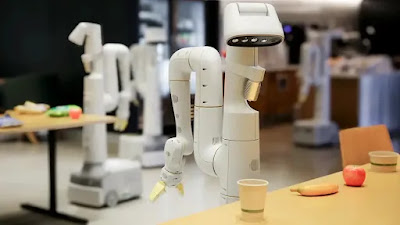DAILY INNOVATION BRIEF by Maryanne Kane, Journalist
DAILY INNOVATION BRIEF
By Journalists Edward Kane & Maryanne Kane
OH BEHAVE!!! GOOGLE DEEPMIND MAKING SURE AI ROBOTS BEHAVE
Source: Google & Stock
- Google's DeepMind has developed new rules for AI robots to abide by when they are doing chores or cleaning your home. Here are some key facts:
- Google DeepMind has written a new set of rules - an operational constitution of sorts - to make AI robots safer
- It's called AutoRT and is designed to enable robots to function like smart humans doing chores safely and accurately
- The guidelines provide robots with better grasp of objects and clearer instructions for doing their chores, such as putting some snacks for the family on the countertop not someplace else
- Enables robots to learn more in real-time "on the fly" to navigate their environment dynamically
- Google's new "rules" encompass a massive amount of data powered by large language models (LLM) and visual language models used in conjunction with a camera
- Extensively tested for months by Google
- At this time, it can handle up to 20 robots simultaneously
- This AI robot advancement by Google DeepMind is designed to make the use of robots safer and enable them to behave well in your home.
HEALTHY PLANTS GROWN WITH LESS PESTICIDES
- University of Southampton (UK) scientists have bio-engineered a plant microbiome, boosted the plant's good bacteria, protected it from disease and significantly reduced the need for pesticides to keep the plant healthy. Here's what we know:
- This is a world scientific first
- UK scientists, along with an international team of scientists from Austria and China, have engineered a plant microbiome for the first time
- They specifically added "good bacteria" to the microbiome to protect it from disease
- This breakthrough could dramatically cut the need for pesticides, which are known to be harmful to the environment
- Microbiomes are the environment of particular bacteria in an organism
- They influence the organism's metabolism, immune system and likelihood of getting sick
- Knowing a plant's microbiome enables scientists to know their vulnerabilities to disease and how to prevent it
- Specifically scientists successfully added helpful bacteria that prevent disease and keep the plant healthy without the need of pesticides
- They successfully used the technique on rice plants but say it can be used in other plants
- The potential of this approach to cut the use of harmful pesticides is said to be significant.
For more news stories like these,
.jpg)




%20(1)%20(1)%20(3)%20(2)%20(2).jpg)


Comments
Post a Comment